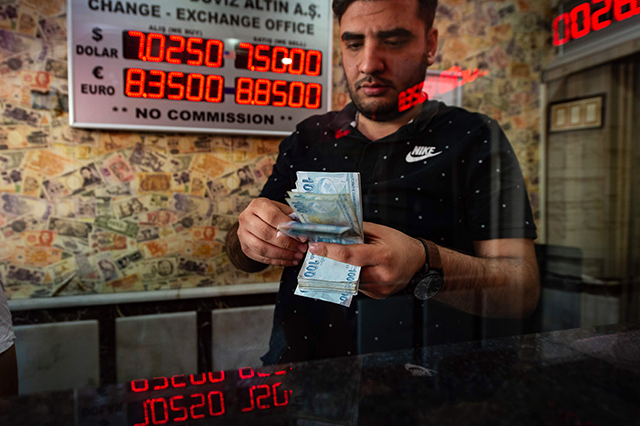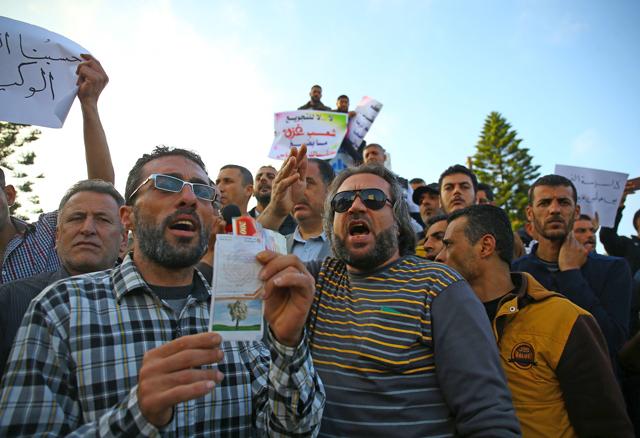You are here
Bank of Israel cuts interest rates to historic low on Gaza war fears
By Reuters - Aug 25,2014 - Last updated at Aug 25,2014
TEL AVIV — Fears that weeks of fighting with Hamas will harm an Israeli economy already hurt by a global slowdown led the Bank of Israel to reduce interest rates for a second month in a row on Monday.
After a surprise reduction a month ago, the central bank again lowered its benchmark short-term interest rate by a quarter-point to 0.25 per cent — an all time low. All 10 economists polled by Reuters had forecast no move.
“Karnit joined the war effort,” said Ofer Klein, head of economics and research at Harel Insurance and Finance, referring to Bank of Israel Governor Karnit Flug.
“It is hard to imagine that without the military operation in the background, the Bank of Israel would choose such an extreme move especially when the United States is already talking about raising interest rates,” he added.
Israel launched an offensive against Hamas fighters in Gaza on July 8 after cross-border rocket strikes by fighters intensified. Thousands of rockets have been fired into Israel, putting consumers off shopping, damaging tourism and curtailing manufacturing activity — particularly in southern plants near Gaza.
“We’re not in a recession but we are definitely in a slowdown in activity,” Flug told Israel Radio following the rate cut.
“We saw this [slowing] in the quarter before the fighting... mainly because of the situation in the global economy, the reduced demands in our main markets and joining this trend now is an additional slowdown as a result of the effects of the fighting,” she explained.
The central bank has estimated the conflict will knock half a point off economic growth.
“That’s not negligible, and of course businesses in the south [where most Gaza rockets are targeted] feel it much more strongly,” Flug said.
The bank previously forecast an expansion of 2.9 per cent this year but it will publish an updated estimate next month.
In the second quarter, the economy grew an annualised 1.7 per cent according to the government’s preliminary estimate, well below expectations of a 2.5 per cent rise and slower than a 2.8 per cent pace in the first three months of the year.
“There was a further slowdown in economic growth, particularly in goods exports, even before the deterioration in the security situation,” the Bank of Israel said in a statement accompanying the rates decision.
It added that labour market data indicate a halt to the improvement in employment and it foresaw in particular an extended negative impact in tourism and in private consumption.
Low inflation
The previous rate of 0.5 per cent had matched that seen during the height of the global financial crisis in 2009 but the benchmark rate had never been lower until today. The rate has gradually fallen from a high of 3.25 per cent in mid-2011.
Two moves in as many months is rare in Israel — last seen in May 2013 when the central bank cut rates twice. But the reduction came amid a seven-year low in the inflation rate and data showing Israel’s economy was weakening.
Israel’s annual inflation rate eased to 0.3 per cent in July — below the government’s target range of 1-3 per cent. Some policy makers have blamed weak consumer demand for the benign inflation.
“There was an additional decline in the inflation environment this month,” the central bank said. It added that expectations in the coming year are close to 1 per cent.
Israel’s shekel weakened by 1.7 per cent this month versus a basket of currencies and “continued depreciation will support a recovery in exports and in the tradable sector”, the Bank of Israel indicated.
Jonathan Katz, economist at Leader Capital Markets, said he thought the central bank would wait a few months before lowering rates again.
“The combination of the decline in inflation, a decline in inflation expectations, a moderation of economic activity in the second quarter even before the Gaza operation and a global picture that is not really encouraging — especially in Europe and Japan — supported the decision to lower interest rates,” he added.
After the rates announcement, the shekel weakened to 3.57 per dollar from 3.5430 while key Tel Aviv stock indexes rose 0.8 per cent.
Flug said the main short-term influence is expected to be in the foreign exchange market, in which the shekel has weakened more than 3 per cent against the dollar the past month to a six-month low — after reaching a three-year high last month and prompting calls from exporters for aggressive action.
“I think that this lowering of the interest rates will contribute to the depreciation, and this will strengthen the ability of exporters to compete in the world, remembering that the world is still in very moderate growth and our main markets are suffering so the ability to strengthen the competitiveness of exports is very important especially at a time like this,” she explained.
Harel’s Klein does not believe the low rate environment will remain for long. “When interest rates start to rise around the world around the middle of 2015, Israel’s rates will also rise,” he said.
Related Articles
ISTANBUL — Turkey's lira on Thursday set a new record low against the US dollar as investors worried about the government's economic policie
Gaza City — Hikes in import and export tariffs imposed by the Islamist rulers of the Gaza Strip since last year have fuelled discontent amon
GAZA — A decision by the West Bank-based Palestinian Authority to impose pay cuts on its civil servants in the Gaza Strip sparked anger amon

















